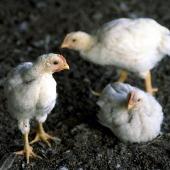Latest Thai bird flu death, poultry industry suffers

The Ministry of Public Health in Thailand has confirmed the country’s 24th human case, and 16th fatality, from bird flu.
A 27-year-old man died from the disease this week. This is the country’s second case of H5N1 avian influenza infection, and second fatality, within the past two weeks, following the death of a 17-year-old boy late last month.
These cases follow an 8-month period in which no human cases were reported in the country.
Deputy prime minister Suchai Chareonratanakul has urged the public not to be put off by the disease and told them to continue consuming eggs and chicken – as long as they are well cooked.
Many countries around the world have banned raw poultry imports from Thailand since the first outbreak more than two years ago.
But Thailand has managed to adapt its industry to work around the bans, and is still the world’s fourth-largest exporter of chicken with overseas sales rebounding.
Thailand’s biggest poultry exporter said declining domestic prices for chicken are to blame for a sharp drop in profits, insisting ongoing fears over bird flu had not affected its overall business.
Charoen Pokphand Foods (CPF) reported its second quarter earnings fell 63 percent due to declining domestic prices and a weak performance by its Turkish subsidiary.
But during a tour of one of CPF’s processing plants outside Bangkok, company officials insisted that it had overhauled its operation to make its exports safe from bird flu, even if the country suffers new outbreaks.
Chanchai Waimaleongora-ek, CPF’s vice president for corporate research and development, said that’s because the company has turned its focus to exporting cooked chicken, which poses no bird flu risk and is not banned.












